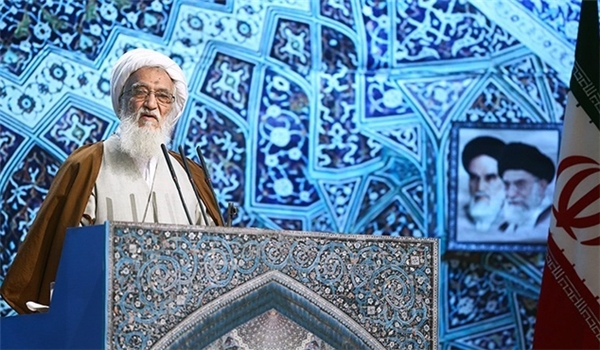
RNA – Addressing a large and fervent congregation of the people on Tehran University campus on Friday, Ayatollah Mohammad-Ali Movahedi-Kermani said, “As said by Supreme Leader of the Islamic Revolution (Ayatollah Sayyed Ali Khamenei), they are enemies of Islam and Iran’s nuclear issue is merely a pretext.”
Elsewhere, he said the Iranian people and nuclear negotiators who resisted bravely and never yielded to the bullying of arrogant powers should be praised.
Advising the foreign nuclear negotiators, Ayatollah Movahedi-Kermani said the Iranian nuclear negotiators speak fairly and “If you accept their words, you never go down”.
He made the remarks after the end of the seventh round of talks between the Iranian and US nuclear negotiations, which were also attended by Helga Schmid, the deputy of EU foreign policy chief, Federica Mogherini.
Iran and the P5+1 group of countries (the US, Russia, China, Britain and France plus Germany) are negotiating to narrow their differences over Tehran’s nuclear energy program ahead of a July 1 deadline.
Iranian Foreign Minister Mohammad-Javad Zarif and US Secretary of State John Kerry held the seventh round of their talks in Lausanne, Switzerland, on Thursday evening.
In relevant remarks on Tuesday, Head of the Atomic Energy Organization of Iran (AEOI) Ali-Akbar Salehi announced that Tehran and Washington had overcome their differences on technical issues with regard to Iran’s nuclear program in most of the cases, adding that both sides were trying to resolve the remaining technical problems.
“We have agreed on 90 percent of technical issues,” Salehi said after his second meeting with US Secretary of Energy Ernest Moniz in Lausanne, Switzerland, on Tuesday.
“There has only remained one very important point of difference that we will try to resolve in the evening talks,” he added.
Salehi is in Lausanne along with Zarif and his negotiating team to hold talks with the world powers on Tehran’s nuclear issue.
The Iranian top diplomat traveled to Brussels on Monday night for an 8-hour visit and meeting with his European counterparts and returned to Lausanne on Tuesday.
On Monday, Zarif and Kerry held discussions for five hours in Lausanne. The meeting was also attended by Salehi, Iranian Foreign Minister’s deputies Sayyed Abbas Araqchi and Majid Takht-Ravanchi and President Rouhani’s Special Aide Hosayn Fereydoun as well as US Energy Secretary Ernest Moniz and US Under Secretary of State for Political Affairs Wendy Sherman.
Iran’s team of nuclear negotiators, headed by Zarif, arrived in Lausanne on Sunday.
The new round of talks is expected to end on March 20.
Iranian and American teams of negotiators held several days of talks in Geneva late in February. Then Zarif, Salehi and Fereydoun as well as Kerry and Moniz joined their deputies two days after the start of the talks.
Zarif, then, traveled to Montreux in western Switzerland two weeks ago for another three days of nuclear talks with Kerry.
Representatives of Iran and the P5+1 also had deputy-level negotiations in Montreux following the Zarif-Kerry meeting.
Both Iran and the P5+1 negotiators have underlined that cutting a final deal before the July 10 deadline is possible.
In relevant remarks earlier this month, Zarif said there was still a good chance for the success of the nuclear talks between Tehran and the world powers, but meantime underlined that failure of the negotiations would never mean the end of world to Iran.
“There is still an over 50% chance for the attainment of an agreement and I feel that both sides believe that success and attainment of an agreement will be much better and useful than failure in the negotiations; yet, failure in reaching an understanding will not be the end of the world but both sides have spent their time and political prestige in the success of these talks,” Zarif said in an interview.
He stressed that the chances for the failure of the talks would be alive as long as agreement was not attained on all issues and details, and said, “As it was said in the Geneva agreement (November 2013), as long as an agreement is not made on all issues, nothing has been agreed on.”
Asked about the removal of the sanctions against Iran, Zarif said, “Removal of the UN Security Council sanctions aren’t complicated and merely depends on the political will (of the other side).”
R111/112/C